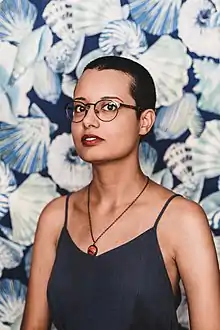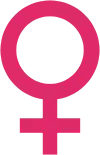Aline Valek
Aline Valek (born 29 July 1986) is a Brazilian writer, novelist, editor and illustrator.[1] She is from Governador Valadares, Minas Gerais but moved to Brasilia early in her life. She graduated in Advertising and Propaganda at the Higher Education Institute of Brasilia, Brazil. She has published two books and currently works as a columnist for Carta Capital, a Brazilian weekly magazine.
Aline Valek | |
|---|---|
 | |
| Born | 29 July 1986 Governador Valadares, Minas Gerais, Brazil |
| Nationality | Brazilian |
| Alma mater | Higher Education Institute of Brasilia, B.A. |
| Occupation | author, writer, novelist, editor, and illustrator |
| Employer | Carta Capital |
| Website | http://www.alinevalek.com.br/blog/ |
| Part of a series on |
| Feminism |
|---|
 |
|
|
Literature and other activities
Valek's first book is called Hipersonia Cronica (2014) and is about Jonatan who suffers from a serious sleep problem. She writes about the impact of this disturbance on Jonatan's life and how the limits between reality and fantasy become not so obvious for him. Her second book, Pequenas Tiranias (2015), is a trilogy of short stories about the everyday lives of common people. As a columnist,[2] Aline Valek mainly writes about feminist topics such as abortion,[3] representations of women in publicity, culture and the connections between women and literature. In one of her columns,[4] she organized a list with the most frequent doubts about feminism brought by her readers. In this Frequently Asked Questions (FAQ), she tries to demystify some issues about feminism. She also has a blog and a weekly newsletter called Bobagens Imperdiveis with more than 2000 subscribers. Valek used to have a podcast, We Can Cast It,[5] in which she talked about pop culture, movies, books, and comic books through a feminist point of view.
Illustrations
As an illustrator, Valek drew the cover and chapters of Jarid Arraes's book – As Lendas de Dandara (2015).[6] This book is about Dandara, a black woman slave, who becomes a warrior and fights for her freedom and against slavery. Moreover, Valek edited and illustrated the cover of the first Brazilian translation of Rokeya Sakhawat Hussain's book Sultana's Dream which was first published in the Indian Ladies Magazine in Madras in 1905. This book is considered one of the first work of Indian feminist science fiction in English. According to Subramanian, Sultana's Dream[7] is a feminist utopia in which the main focus is women's education.[8] Science and knowledge play important roles for her. In Sultana's Dream, the heroes are university women who are capable of making important contributions in diverse areas such as medicine and agriculture. Through this short story, Sakhawat was able to raise some questions about women's education in Indian society. Her concepts about this topic is similar to the arguments brought by Mary Wollstonecraft in A Vindication of the Rights of Women.[9] Both authors argue in favor of women's education and believe in women's rational abilities. In their epoch, such statement was a powerful argument against the status quo.
Feminist activism
In one of her interviews,[10] Valek explains that science fiction can be a tool used by feminist writers to raise questions about gender roles, transphobia, race, and sexuality. Within feminist science fiction, Valek and Lady Sybylla organized a collection of ten short stories called Universo Desconstruido.[11][12][13][14][15][16][17][18] She claims that through this genre different points of view emerge and it contributes to bring reflection about how the world is and should be. According to Cranny-Francis,[19] feminist science fiction is not a generic fiction with female protagonists. In fact, feminist writers can act as a political actors. Science fiction "may be a site for the allegorical description of social injustices displaced in time and/or place from the reader's own society, but still clearly recognizable as a critique of that society".[20] In Universo Desconstruido, Valek also published a short story. In her tale – Eu, Incubadora[21] – Valek imagines a society in which abortion is equivalent to murder and no women would be able to terminate a pregnancy under any circumstances. Diana, the main character, is judged in the court of law because she refuses the role of being a mother and transferred her unborn child to a machine which works as an incubator. In her judgement, questions about life, abortion, individual choice, women's body, freedom and gender roles are brought as an attempt to justify her decision against a male jury and authorities. Valek draws a parallel between the microcosm of Diana's judgment in court and the actual Brazilian society. Currently in Brazil, there is a growing effort by the religious, right wing politicians in parliament to restrict, even more, access to abortion.[22] In this sense, Valek uses science fiction as a way to challenge phallocentric concepts of abortion and women's body which are used to propagate domination and inequality. She employs pop culture as a political tool and brings into this universe an actual debate which takes place in Brazilian society. Similarly, bell hooks[23] (1994) talks about how important it is to bring a feminist discourse on the terrain of popular culture. In this domain, feminist ideas can be heard by a wider audience located outside of universities. She argues that if feminist ideas stay away from popular culture, we are responsible for an increase in hegemonic antifeminist discourse. In this sense, bell hooks talks about a feminist activism through pop culture which it can be seen through Valek work as a writer and editor.
From zines to newsletters
In one of her posts,[24] Valek talks about zines and what she learned through them. She explains how to make a zine and tells us about her own experience. She started producing zines during her adolescence. She noticed that her process of writing used to be spontaneous without a previous script and the themes were mostly about her daily life. According to Valek, the experience acquired through zines made her to gain expertise as a writing and publisher. She became aware of the whole process from the first draft to distribution. In another post,[25] Valek reflects about her newsletter. In 2014, she started a newsletter called Bobagens Imperdiveis.[26] In her view, newsletters have a dynamic form of communication in which readers can have a more active participation. Because people subscribe to receive a newsletters, Valek believes that communication between author and reader increases. Consequently, intimate conversations can take place. Instead of a static post in blogs, newsletters can provide more feedback from her audience. In this sense, she claims that her writing is open to ideas and suggestions from her readers. Through her newsletter, Valek talks about her thoughts, ideas, events that took place in her life, books, movies, and so on. According to Valek, in her newsletter, she is free to talk about any theme in a more casual way. There is a tone of intimacy. In this fashion, through her former zines and her actual newsletter, Valek supports the manifest advocated by Cixous[27] (1976). Valek follows Cixous's appeal in which all and each woman is convoked to write about herself and her world in order to challenge the rules of the phallocentric society. As an accomplice, Valek puts herself into the text and invite us to know her world through her writing.
She claims that her writing is her form of activism.[28]
See also
References
- Coutinho, Sabrina. "6 autoras e ilustradoras que você precisa conhecer". Revista Pólen (in Portuguese). Retrieved 13 October 2015.
- Valek, Aline. "Escritorio Feminista". Carta Capital. Archived from the original on 21 March 2016. Retrieved 12 October 2015.
- Valek, Aline. "Chers candidats, et si on parlait de l'avortement ?". Autres Bresils Un decrytage de la societe. Retrieved 13 October 2015.
- Valek, Aline. "FAQ Feminist". Carta Capital. Retrieved 12 October 2015.
- Valek, Aline. "We Can Cast It". We Can Cast It. Retrieved 13 October 2015.
- Arraes, jarid. "As Lendas de Dandara". As Lendas de Dandara. Retrieved 12 October 2015.
- Jahan, Roushan. "Sultana's Dream". The Feminist Press. Archived from the original on 17 May 2012. Retrieved 13 October 2015.
- Subramanian, Aishwarya. "Sultana's Dream by Rokeya Sakhawat Hossain". Strange Horizons. Archived from the original on 24 September 2015. Retrieved 13 October 2015.
- Wollstonecraft, Mary (1997). The Vindications: The Rights of Men and The Rights of Woman (Toronto: Broadview Literary ed.). D.L. Macdonald and Kathleen Scherf. ISBN 1-55111-088-1.
- Arraes, Jarid. "Aline Valek: " A Literatura e nossa tambem"". Portal Forum. Retrieved 13 October 2015.
- Martins, Dana. "Analisando Universo Desconstruido: O que essa tal ficcao cientifica feminista tem a dizer? (parte 2)". ConversaCult. Retrieved 12 October 2015.
- Think Olga. "Entrevistas e Reflexoes". Olga. Retrieved 12 October 2015.
- Costa, Antonio Luiz M.C. "Por uma ficcao cientifica feminista". Blog do Antonio Luiz. Retrieved 12 October 2015.
- Martins, Dana. "Analisando Universo Desconstruido: o que essa tal ficcao cientifica feminista tem a dizer? parte 1". Conversa Cult.
- Melo, Carolina. "Universo Desconstruido: contos de ficcao cientifica feminista". apesar da linguagem. Retrieved 12 October 2015.
- Leite, Thiago. "Universo Desconstruido Ficcao Cientifica Feminista". Teia Neuronial. Retrieved 13 October 2015.
- Naisa, Leticia. "O " Universo Desconstruido" e a ficcao cientifica feminista brasileira". Motherboard. Retrieved 13 October 2015.
- Valek, Aline. "Universo Desconstruido". Retrieved 13 October 2015.
- Cranny-Francis, Anne (1990). Feminist Fiction Feminist Uses of Generic Fiction. Cambridge: Polity Press. ISBN 0745605273.
- Cranny-Fracis, Anne (1990). Feminist Fiction Feminist Uses of Generic Fiction. Polity Press. p. 9. ISBN 0745605273.
- Leite, Thiago. "Universo Desconstruido". Teia Neuronial. Retrieved 13 October 2015.
- Brilhante, Roberto. "Os Perigos do Estatuto do Nascituro". Carta Maior. Retrieved 13 October 2015.
- hooks, bell (1994). Outlaw Culture. Routledge. pp. 96–105. ISBN 0-415 38958-5.
- Valek, Aline. "O que aprendi fazendo fanzine". Medium.
- Valek, Aline. "1) Como o e-mail mudou mina forma de blogar – Minha experiencia ao criar uma newslatter como isso transformou mina forma de escrever". Medium. Retrieved 13 October 2015.
- Valek, Aline. "Bobagens Imperdiveis". Archived from the original on 3 September 2015. Retrieved 13 October 2015.
- Cixous, Helene (1976). "The Laugh of the Medusa". Signs: Journal of Women in Culture and Society. 4 (1): 875–893. doi:10.1086/493306.
- Borborema, Michelle. "Aline, feminista no blog e na rua". Donas de Casa. Retrieved 13 October 2015.